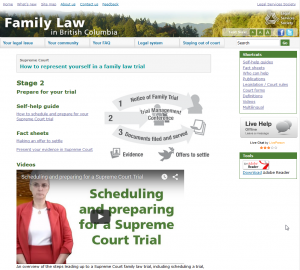2016 Bi-monthly Update Series: March-April
In our 2015 year-end update, we promised to provide bimonthly updates to new resources and services added to Clicklaw in those two months. Here is a selection from the hundreds of changes in March and April:
Jan-Feb | Mar-Apr | May-Jun | Jul-Aug | Sep-Oct | Nov-Dec
Battered Women’s Support Services
by Battered Women’s Support Services
See BWSS’ expanded legal advocacy program which includes full representation (family and immigration matters), and other help on family law issues: workshops, a family law clinic and a court forms preparation clinic.
Islamophobia Hotline
by SABA BC, Access Pro Bono, National Council of Canadian Muslims, BCPIAC, FACL BC, CLAS, BCCLA, CABL, CBA BC
Free confidential legal advice if you feel that you have been discriminated, harassed, or faced violence because you are Muslim or were perceived to be Muslim: 604-343-3828

by Canadian Civil Liberties Association
Want to know what a police record is? How to try to deal with a non-conviction record? What privacy and human rights laws apply, or best practices for employers? Check out this resource from the CCLA.

by LSLAP Law Students’ Legal Advice Program
See the latest links for LSLAP’s updated legal advice manuals.
Coping with Separation Handbook
by Legal Services Society
For spouses (married or living in a marriage-like relationship) dealing with the emotional aspects of separating. Describes ways to cope and how to help your children cope. Includes support services for spouses, parents, and children, and where to find legal help.

by Disability Alliance BC and CLAS
In 2013, the process to appeal the denial of Canada Pension Plan Disability (CPP-D) changed when a new system, the Social Security Tribunal (SST), replaced the Review Tribunal. This guide will help people and advocates who are appealing denial of CPP-D to the SST. The guide has been updated in 2016.

by Atira Women’s Resources Society
See updated information for Atira’s Legal Advocacy Program for Women in the DTES, Atira’s Weekly Summary Legal Advice Clinic, and Atira Women’s Court Form Preparation Clinic.
The McKenzie Friend: Choosing and Presenting a Courtroom Companion
by NSLRP
As a self-represented litigant, you may bring someone to sit with you at the front of a courtroom when you are appearing before a judge or master. You must ask the judge for permission for this person – often a friend or family member – to sit beside you and help you through the process.

by Heritage Law
This publicly available wikibook will help you understand the steps involved in being an executor and probating a will.

by Legal Services Society
This graphic novel tells the story of Maya, who is leaving her abusive partner but doesn’t know where to get help. Through illustrations and clear basic legal information, Leaving Abuse shows how she finds the support and legal aid she and her children need to stay safe and start a new life.

by Thompson Rivers University (TRU)
The Community Legal Clinic (CLC) is the first student-staffed pro bono legal clinic in the Interior of British Columbia. The students and the supervising lawyer are a passionate team providing legal assistance and advice to those who would otherwise be unable to afford legal assistance.

by BC Registry Services
The new Societies Act will come into effect on Nov. 28, 2016. In the two years following that date, every preexisting society will be required to “transition” to the new Act. This document sets out some basic information about the transition process and other matters that societies may wish to consider over the coming months.

by Consumer Protection BC
Consumer Protection BC is the licensing and regulatory body for the debt collection and repayment industry (which includes debt collectors, collection agencies, bailiffs and debt repayment agents). They provide information on your rights & obligations around debt collection practices. Includes links on how to dispute a debt, request communication in writing only, or notify a collection agency you are not the debtor.
Includes updated information on debt collection practices. See also blog post on Debt Repayment Agents: New Rules are in place and New things to know about BC’s debt collection laws
 Notice – BC Government URLs
Notice – BC Government URLs
You may have noticed that some of the links to websites hosted by the BC Government may be broken as they restructure. We are currently working with BC Gov website staff to keep links updated. For example, see the updated link to Family Justice in BC.










